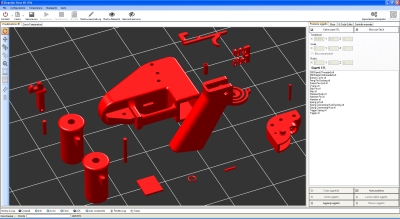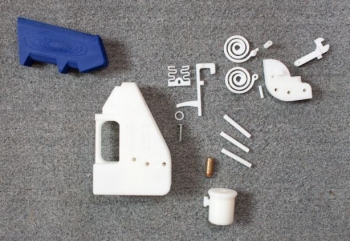- makeITcircular 2024 content launched – Part of Maker Faire Rome 2024Posted 2 weeks ago
- Application For Maker Faire Rome 2024: Deadline June 20thPosted 2 months ago
- Building a 3D Digital Clock with ArduinoPosted 7 months ago
- Creating a controller for Minecraft with realistic body movements using ArduinoPosted 7 months ago
- Snowflake with ArduinoPosted 8 months ago
- Holographic Christmas TreePosted 8 months ago
- Segstick: Build Your Own Self-Balancing Vehicle in Just 2 Days with ArduinoPosted 8 months ago
- ZSWatch: An Open-Source Smartwatch Project Based on the Zephyr Operating SystemPosted 9 months ago
- What is IoT and which devices to usePosted 9 months ago
- Maker Faire Rome Unveils Thrilling “Padel Smash Future” Pavilion for Sports EnthusiastsPosted 10 months ago
DEFCAD. A CrackDown on 3D printable Guns: Security or Censorship?
I was very impressed in the last days of the much talk that has been done around the Liberator, the first 3D printable gun, available for download on Defcad.
 The amateur, DIY guns, are not new, it is not the 3D printing today to make a difference: even if the team is working on a version of the liberator that is available for printing on RepRap printers, today print the Liberator is still complicated and may not work.
The amateur, DIY guns, are not new, it is not the 3D printing today to make a difference: even if the team is working on a version of the liberator that is available for printing on RepRap printers, today print the Liberator is still complicated and may not work.
In a sense, however, we see the beginning of a process of guerrillas democratization, as already someone has pointed out in the past. John Robb, studying Global Guerrilla and resilient communities for years now, wrote a post a few days ago, at the time of the Boston attacks. It was on Open-source warfare:
The grievances and motivations for attacks never die. They can always find a corner of the Web to fester and grow, in groups too tiny to ever control.
The information needed to conduct attacks will always be available, and with each round of incidents, the information improves through testing.
[…]
Due to technological and behavioral factors, the quality of the attacks can better very quickly once a a conflict ignites. Weeks can yield significant progress instead of years.
If we face the question from a perspective that is solely about how much information will be available to criminals, for sure this gets quite frightening.
Is the next bomb going to be open source?
As the US government proceeds with the DefCad downloads cancellation I’m not sure of how much open and accessible information we will be having access in the future.
This sounds a bit like an emotional crackdown that is not worried that the files have already been downloaded and will continue circulating on p2p networks and may appear online on foreign servers with relevant ease.
The point here is not preventing the files to be downloaded, it’s merely about avoiding a public discussion on open source warfare. Nothing actually prevents these websites and information to thrive in the so called “dark web” but we are prevented as a society to discuss publicly about that topic. I’m really not sure this is going to be a good decision.
In fact, If we look at the situation from the perspective of how much information will be available to society, how much discussion will be made about this, we may arrive to different conclusions.
A comment on engadget few days ago brought the point to the surface with a clever consideration:
“If some psycho wants to make a plastic gun, with plastic bullets, no metal parts, and try to hijack a plane, there is no stopping them. It is better for the population to understand the limitations of this type of weapon than try to outlaw it. If the people on a plane know he only has one shot, it only takes one hero out of a plane full of people to rush the guy and use up that shot. Also, there is a high probability it wont even be lethal, more bark than bite.
If we outlaw anything it should be the decisions made on emotion instead of logic.”
Knowing how this kind of objects appear (or work) could be highly beneficial to safety as the public may be informed about how to recognize, spot and report (or even sabotage or break) thanks to the publicly available information. Gun hackers might be soon inventing the next trick to do all kind of exploit to the gun, as long as this information is available.
This sounds interesting with a gun but it’s even more interesting and hard to manage if you think to a bomb, mine or who knows what. Shall we be really advocating public disclosure in that case? Isn’t it that we are not much concerned with guns only because guns are quite common in our experience (and the Liberator seems like a toy)? What is the exact point where we shall start to be concerned if information is available to the people?
This turns back to the Wikileaks debate, even if it’s more direct: people can’t get access to information because it’s better for society to keep it proprietary.
If the discussion has been interesting to you until this point, you might find extremely important the fact that the arms market is a $1,000 billion business.
Is it again about censorship?
The true point here is that we should advocate for opensourcing data about arms that are already on the market and not just ask the possibility to create open source versions.
The open source warfare is not going away, only the public discussion is being turned off at this point. I’m sure that the next innovation in arms in not going to be open source, will be a proprietary technology and a big business as often.
I’m skeptikal we are going to have an open source bazooka anytime soon as much as about the future of a honest and open discussion on arms and defense.

















Pingback: Welcome to the World’s First 3D Printed Metal Gun | Open Electronics